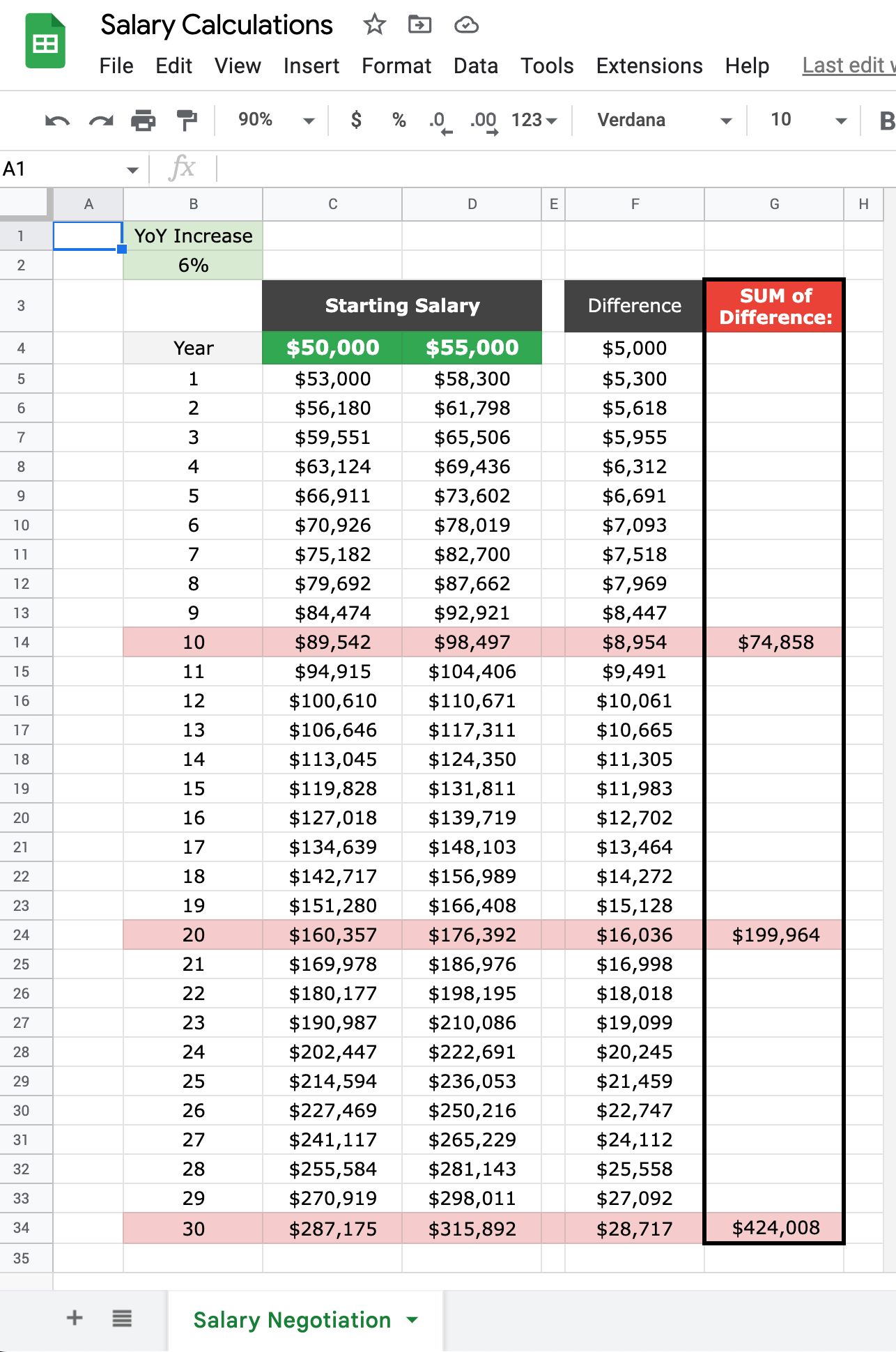5 Practical Tips for Negotiating Your Salary
When negotiating your salary, make sure to rely on facts as to why you deserve what you’re asking for and don’t accept an offer that’s too low!
Watch it in action
Why most people fail
61% of people fail at negotiating a higher salary (Source: Robert Half). That’s because most people don’t even try to negotiate for a higher salary
The most common reason candidates are hesitant to negotiate salary is because they believe they have no bargaining power. What you may not know is that the hiring process is stressful and expensive for the employers as well. The employer is invested in those candidates, so even fresh grads have some bargaining power! 💪🏼
3 Consequences of NOT negotiating
1. You lose out financially
Imagine 2 people with a 10% difference in starting salary—$50k and $55k a year. Let’s say they both receive a 6% salary increase each year. By year 10, the difference in cumulative pay will be around $75k and by year 30—a whopping $424k! 💸

When you take into account future career moves and future pay packages, the US$ 424K gap is usually way larger!
2. You lose out on factors employers could have say yes to
More vacation days, education reimbursement, a later start date…the opportunities are endless!
If you never ask, you’ll only be left wondering what could have been!
3. You lose out on opportunities to make a strong impression
Negotiation is a valuable life skill that benefits you both personally and professionally. The fact you are even attempting to negotiate can make you look more attractive in the employer’s eyes. 🤩
So how exactly do we negotiate our salary? Here are my top 5 techniques.
Tip #1 - Imagine you are negotiating for a friend
This subtle change in mindset can help you become more confident and assertive.
Think about it—your close friend worked hard for this offer, spent countless hours on interview prep, revamped their resume 20 times, gave up Netflix for a month, don’t they deserve to be paid their worth?
Aren’t you angry they are being treated unfairly? That’s called indignation. Use that to overcome your fear of negotiation.
Tip #2 - Give a specific salary figure
It’s better to give a specific number as opposed to a nice round number.
For example, if you propose $57,650 instead of $57,000, you are much more likely to get to a final number closer to what you were expecting.
According to Columbia Business School, your employer is more likely to assume you’ve done extensive research into your market value to reach that specific salary number.
Tip #3 - Have a “walk away” point
Basically, have a worst case scenario in mind. This means that you are mentally prepared to walk away if the final offer is so low you have to turn it down. You don’t want to accept an offer that is not financially viable or make you regret it afterwards!
Of course, you should do your own research and check out salary ranges. I advise choosing a target number at the 80-85% mark.
Here are some websites to check salary ranges:
Tip #4 - Come with facts, not feelings
Your employer is more likely to consider your salary negotiation proposal if you provide justification as to why you deserve what you’re requesting.
Saying you deserve a 15% increase in salary because you have 2 more years of working experience than the average person on the team is a much stronger argument!
Here’s a sample response:
The industry average is $62,500 a year not including benefits, and I found that Unilever actually pays a bit more than that at $64,000. The offer you gave is slightly below these numbers, and I’d like to understand a bit more about the reasoning behind that.
With my 4 years of experience in consumer goods since graduation, and based on my conversation with the hiring manager, I feel like I am uniquely positioned to help with this issue she’s facing.
Is there any way we can get closer to the industry benchmark?
Make sure to use neutral language, do your competitor research, and talk about why you’re worth it!
Tip #5 - Negotiate ethically
You should only negotiate with an employer whose offer you plan to accept if the negotiation goes well. You should NOT go into a negotiation if you have no intention of accepting the offer!
Once you have accepted an offer, you shouldn’t continue interviewing with other employers. If you are currently negotiating with other organizations, you should let them know that you have already accepted an offer and will be withdrawing from the application process.
🌟 Bonus Tip - Show your appreciation
It doesn’t hurt to show how grateful you are to have received the job offer throughout the salary negotiation process. This will help you come off as more likable and that you have good intent!
Looking to switch jobs?
Make sure you know these 5 LinkedIn tips for job seekers!